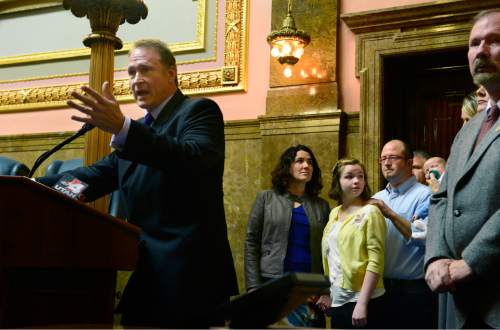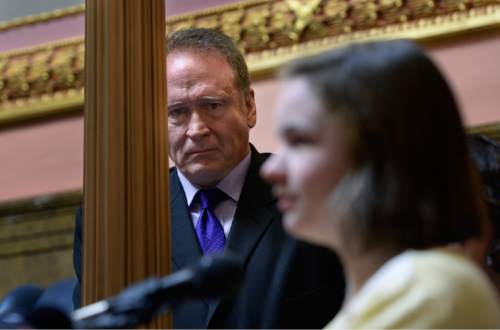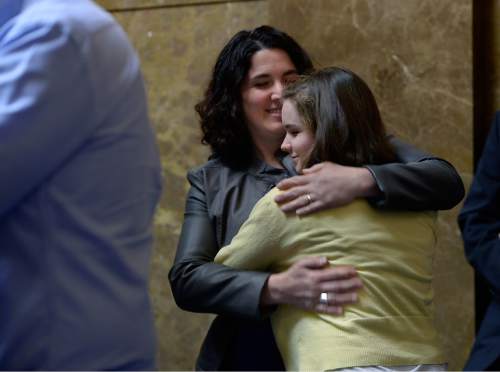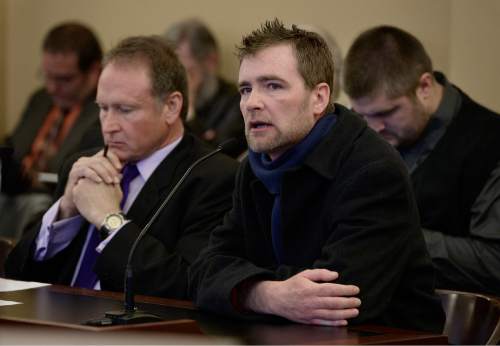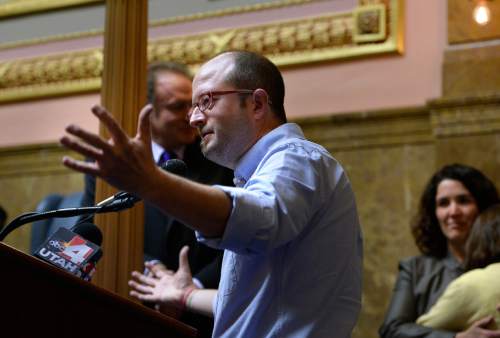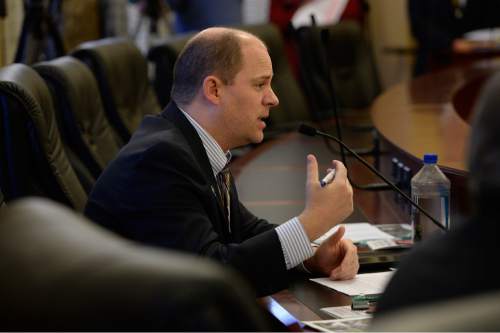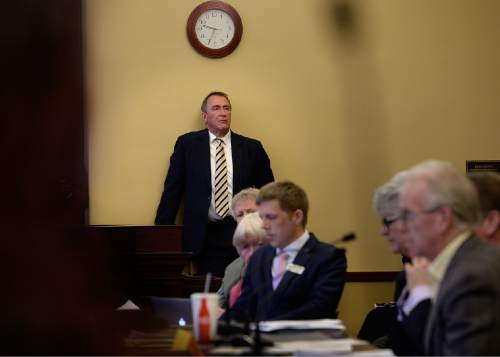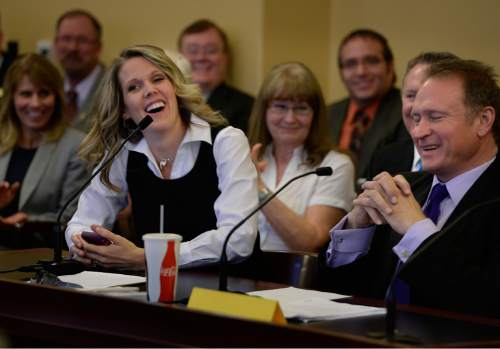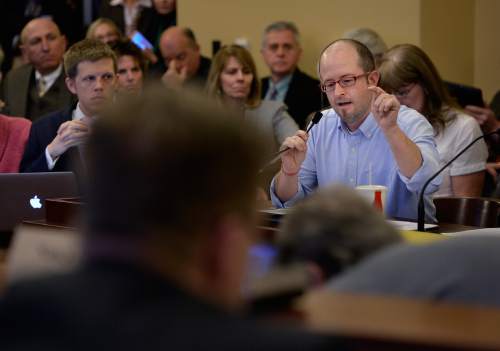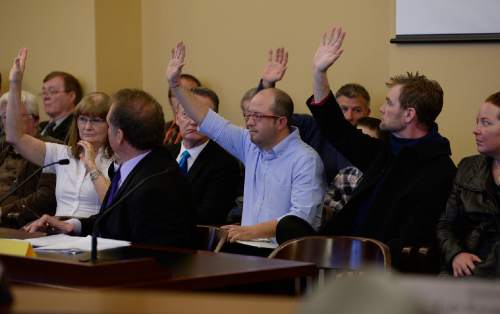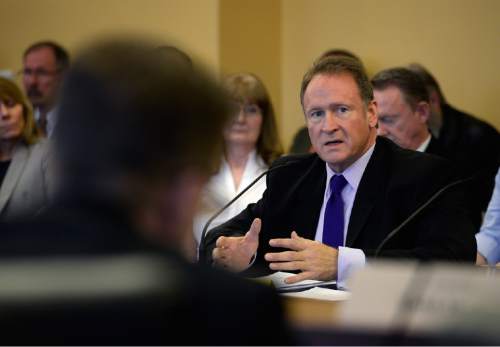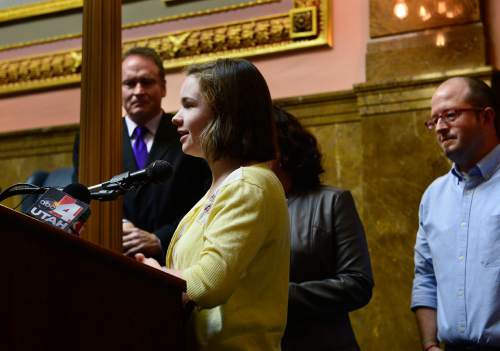This is an archived article that was published on sltrib.com in 2015, and information in the article may be outdated. It is provided only for personal research purposes and may not be reprinted.
Forrest Shaw is chemically castrated and dying of prostate cancer at 42.
But the thing that worries him most, he told a Utah Senate panel Thursday, is going to jail for using medical marijuana and having his home seized, leaving his wife and two kids with nowhere to live.
"I'm horrified of being locked up in a cage," said Shaw, who testified along with others who use cannabis to relieve their pain from chronic or terminal diseases.
They urged Senate Judiciary committee members to recommend SB259 to the full Senate, and the committee obliged Thursday, voting 3-2 for the bill.
Sponsoring Sen. Mark Madsen, R-Saratoga Springs, said the Senate could consider his medical cannabis bill as early as Monday.
Madsen, who has chronic back pain, tried medical marijuana tinctures and candies two weeks ago in Colorado, and found them effective enough that he said it was difficult to toss all that he'd purchased in Grand Junction before crossing back over the state line.
The measure faces long odds in Utah's Legislature. Gov. Gary Herbert is skeptical. State and federal law enforcement generally oppose the idea. Others point to taxing and banking difficulties states including Colorado have not been able to resolve.
Still, lawmakers were reluctant to kill the idea outright.
Sen. Daniel Thatcher, R-West Valley City, was the only committee member to comment during Thursday's discussion, and he urged his colleagues to put medical marijuana on the agenda for an interim session.
He's inclined to let doctors prescribe cannabis, Thatcher said, "If we're not talking about stoners getting high in a basement." And he worries about a new industry that will lead to "pot robbers."
John Valentine, chairman of the Utah Tax Commission and former state senator, said the bill won't work as currently written. SB259 would put the Tax Commission in charge of licensing and other matters, but, Valentine said, "There isn't a single tax in this bill."
Legal questions surrounding cash from the marijuana trade are not resolved and Colorado is warehousing cash there, he said. "There is no safe haven for the money."
A U.S. Drug Enforcement Agency agent warned against legalizing marijuana until the science is clearer, issuing a position paper on Madsen's bill noting the American Medical Association and the American Academy of Pediatrics both oppose legalization of cannabis.
"Utah shouldn't consider bringing medical marijuana to law without scientific/clinical evaluation," Nicki Hollmann, assistant special agent in charge for the DEA in Utah, said in a statement. "Laws...should be based on science and well-reasoned policy, not changes in public opinion or what other states are doing."
And Wade Carpenter, president of the Utah Chiefs of Police Association, said Colorado's experience should be a lesson for Utah.
In that state, three homes blow up each month because people are improperly processing cannabis products in their homes, he said. His counterpart in Colorado has told him of 300 illegal pot-growing farms.
"It's absolutely untrue that you get rid of cartels," said Carpenter, Park City police chief. "Any time it's a cash-based business, there are huge issues with tracking."
But Madsen noted his bill calls for a non-cash industry, and that the state would tightly control cannabis from "seed to sale."
Under SB259, specialists who treat diseases such as cancer, Crohn's, glaucoma, Alzheimer's, Amyotrophic Lateral Sclerosis (ALS), Post-Traumatic Stress Disorder (PTSD), AIDS, or chronic pain would be able to prescribe cannabis to a patient.
The patient would have an electronic card, which would act as both the prescription and method of payment. He or she would "load" money on the card, and buy the cannabis product at one of dozens of state-licensed dispensaries around the state. Smokable cannabis would not be sold.
Madsen said it was "classic propaganda" that led to outlawing medicinal uses of marijuana in the 1930s. The "gloom and doom" predicted in the 23 other states that have legalized medical marijuana has not happened, he said.
"We need to push past the propaganda of the past, the bigotry of the past," he said.
A series of Utahns testified about their relief after taking medical marijuana.
Tenille Farr of Spanish Fork told of moving, temporarily, to Colorado and then to California last fall so she could legally "juice" marijuana leaves in an attempt to slow the spread of Hodgkin's lymphoma.
The 38-year-old was 18 weeks pregnant when she learned she had the disease last August. She gave birth to her fifth son, Gabe, on Jan. 4.
Before her diagnosis, Farr said, "I didn't even know what cannabis was.
"We prayed and fasted and decided that cannabis was the right thing to do," she said. Her tumor shrank and persistent itching eased, but Farr knows her cancer is not fully gone.
"I'd love to have the freedom to choose cannabis over chemotherapy," she said.
Christine Stenquist of Kaysville, 42, said she had nearly two decades of pain from fibromyalgia and a brain tumor that was not fully removed. Three years ago, she began vaping marijuana at the suggestion of her father, a long-time narcotics officer in Florida. Immediately, her pain eased.
Aaron Campbell of Orem said he sees it as his duty as a father to help ease the pain suffered by his 16-year-old daughter, Madelena.
Her 19-year-old sister died several months ago from the same genetic disease that afflicts Madelena, and their 9-year-old brother also has metachromatic leukodystrophy.
An emergency room physician from Cedar City, Michael Wilson, said there is not definitive evidence that cannabis can cure as well as ease pain, but there are case studies and anecdotal evidence that it can.
Wilson has a 16-year-old daughter, Raquel, who was diagnosed last year with an advanced brain tumor. She could benefit from cannabis, but the family might have to travel to Mesquite if the Legislature rejects medical marijuana, he said.
"It's a decision that ought to be left up to physicians and the families," he said.
Twitter: @KristenMoulton


